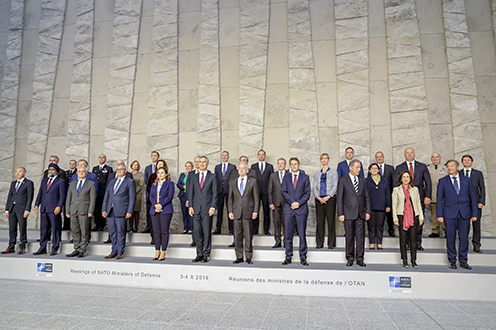"Spain is a staunch and dependable partner committed to NATO", says Margarita Robles
News - 2018.10.4
She made her statement in reference to the list of capacities that each member state has to contribute to NATO.
Furthermore, in the face of new hybrid threats and those emerging in cyberspace, she highlighted the rigour with which Spain is acting in this field, passing on a message of prudence in terms of the way that these situations were dealt with. "They exist and are real", she said.
Referring to these threats, she also noted that "they involve a different mechanism from the conventional and traditional defence to which we are accustomed". She pointed to the importance of the meeting in highlighting the role of collaboration and joint work between all the members of the Alliance as a prevention mechanism to these threats, given their nature.
Margarita Robles also stressed the importance of public opinion being aware that organisations such as NATO or the European Union are working for security and defence. She explained that the Ministry of Defence tries not to generate unnecessary alarms and that work is being done to prevent any threat.
Meeting of the North Atlantic Council
At the plenary sessions held in their different formats during the days of the meeting, the main issues addressed by the 29 NATO defence ministers were the division of labour and commitment to defence investment, NATO-EU cooperation and the new threats in the current context.
At the Brussels Summit last July, the allies maintained a position in favour of continuing with the commitment to defence investment agreed at the Wales Summit of 2015, reaffirming their intention of submitting credible national plans to the Alliance to comply with the agreement. Spain maintains this commitment, and is continuing to increase its defence investment. The Ministry is working on a plan to allow Spain to continue being a committed ally.
With respect to NATO-EU European Defence and Cooperation, Spain maintains a high level of commitment to both organisations and is working to improve this cooperation through a more robust Common Security and Defence Policy, which not only does not clash with NATO, but will contribute to the development of some military capacities from which the Alliance will benefit. Taking part at this meeting as a guest was the High Representative of the European Union for Foreign Affairs and Security Policy, Federica Mogherini.
Other meetings
On Wednesday afternoon, Margarita Robles met with the countries that are deploying troops as part of the enhanced forward presence (eFP) operation, consisting of a continuous presence of military units in the allied countries of eastern Europe (Estonia, Latvia, Lithuania and Poland). Currently Spain has 346 troops deployed in Lithuania, as well as more than a hundred light and armoured vehicles.
Within the framework of multinational cooperation, the Ministry of Defence signed a Declaration of intent for the introduction and improvement of capacities in Maritime Unmanned Systems together with the other ten ministers of defence that form part of the project. Continuous cooperation in this field aims to ensure maximum consistency, synergies and interoperability between all the participants in the programme.
The Minister for Defence also held bilateral meetings with her opposite numbers from Canada, Italy and Romania. The meetings analysed the state of cooperation on matters of defence, and served to strengthen ties of friendship and cooperation between the countries involved.
Canada will lead the multinational brigade forming part of the eFP, which includes Spanish units participating in the mission. The Canadian navy plans to award the contract for the construction of 15 frigates at the end of this year as part of Canada's surface fleet renewal. The Spanish shipbuilder Navantia is one of the bidders.
Spain is also collaborating with Italy and Romania within the EUNAVFOR MED Operation Sophia together with other European countries. Its headquarters is located at the Sigonella Naval Base in Italy. This mission is part of the European Union's integrated response to the migration phenomenon, which aims to address not only its physical component, but also the root causes, including conflicts, poverty and climate change.
Non official translation





